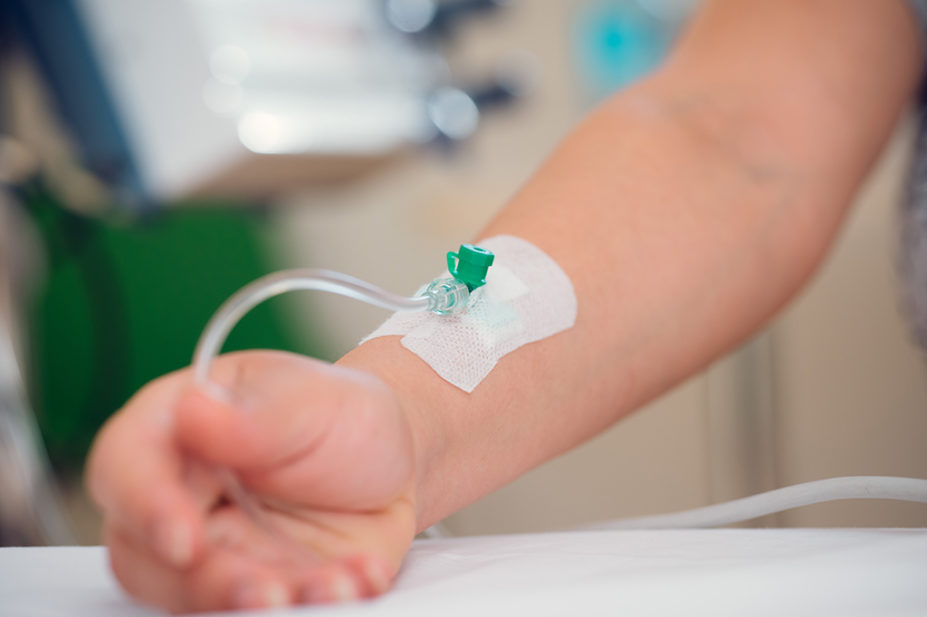
Shutterstock.com
More than 90% of pharmacy intravenous (IV) systemic anti-cancer therapy (SACT) services across the UK have had to delay patient treatment because the necessary drug was not available at the scheduled administration time, a national evaluation has found.
Of these, more than a quarter (27%) said the shortages happened weekly, with the report concluding that “urgent action” is needed to address ongoing issues with treatment delays and workforce in pharmacy IV SACT services.
The national IV SACT survey, which was conducted on behalf of the Royal Marsden NHS Foundation Trust and the British Oncology Pharmacy Association (BOPA), gathered experiences from across the UK of IV SACT delivery for the period January 2022 to June 2022.
Overall, 69 completed responses were received, including 50 from SACT providers in England, 4 in Scotland, 12 in Wales and 3 in Northern Ireland. The survey asked respondents about staffing levels, service quality, day unit capacity and workload trends (see Box).
In total, 91% of respondents reported that their pharmacy service had been responsible for ‘same day’ delays in treatment, defined as any occasion when a patient’s IV SACT was not available at the scheduled administration time.
When asked how often pharmacy were responsible for same-day delays, 45% reported this happened monthly, while 27% said it happened weekly and 16% reported delays happening on a daily basis.
The most common cause of pharmacy-related delays in delivery of IV SACT was a delay in delivery of SACT by commercial compounders (69%), followed by delayed preparation within the pharmacy aseptic unit (62%), delays in prescription screening (55%) and delays in the checking or release of SACT (any source) (45%).
The survey examined occasions where a patient’s treatment had to be rescheduled to a different day owing to pharmacy being unable to provide their IV SACT.
Of the respondents, 76% reported that this had happened at least once in the past six months, with 43% reporting this happened at least monthly and 24% at least weekly.
The main causes of these specific delays included known staffing issues (33%), aseptic unit capacity (35%), or failure of the commercial compound/NHS unit to supply the drugs (67%).
“Pharmacy IV SACT services are under considerable strain, and approaching a crisis point,” the report concluded.
“Currently, this is manifesting itself in poor patient experience, recruitment and retention problems, and treatment delays.”
Rob Duncombe, chief pharmacist at the Royal Marsden NHS Foundation Trust, said: “Over recent months, I have been struck by the number of occasions we have had patients who have had their treatments delayed as a result of issues in pharmacy. The results of this survey show that this is a national problem.”
Duncombe said that the causes of the delays were “muti-factorial” and would take a “significant amount of effort” locally and nationally to resolve.
“At the end of the day, there is a patient with cancer waiting for us to deliver their treatment and we all need to be re-doubling our efforts to make sure that they have the very best experience at what is an incredibly difficult time in their lives.”
The report recommended that “urgent action” was needed to address the issues identified by the report, including a review of the regulatory environment in which aseptic units operate, to enable units with capacity to support other hospitals within their integrated care system, and action to ensure that pharmacy teams are a part of all capacity planning discussions regarding IV SACT services.
NHS England was approached for comment but did not provide one in time for publication.
Box: Other findings
Staffing:
- In technical services, the hardest posts to fill were band 3 and band 4, while the highest percentage of vacant posts were at band 7;
- In clinical services, the hardest posts to fill were in band 7 and band 8, while the highest percentage of vacant posts were at band 4.
Day unit capacity:
- 40% of respondents said that their institutions were experiencing delays in getting patients started on IV SACT;
- Of those that reported delays, 23% said the delay was less than 1 week, 45% said one to two weeks and 18% said two to four weeks;
- 45% of respondents said that the pharmacy team were involved in capacity planning discussions at their institution.
Workload trends:
- 85% of respondents reported that workload had increased compared to pre-COVID-19 levels;
- 96% anticipated that it would continue to rise over the next five years.
Overall concern:
- Participants were asked to rate how concerned they were about IV SACT services and their ability to continue to supply IV SACT to patients over the next two years on a scale of 1–10 (1 = no concerns, 10 = extremely concerned);
- The median score was 8.
2 comments
You must be logged in to post a comment.

This excellent survey highlights the need for ready to administer drugs to be made available from the pharmaceutical industry. Hospitals should be prepared to pay a small premium for the drugs presented in this way.
Agreed but there is also a need for regional / national hubs to be established within the NHS to produce batches of products which are not available from commercial sources. In addition to the question of whether the NHS is willing to pay a small premium for these products there is a need to establish a system to standardise these products to make them commercially viable to produce.